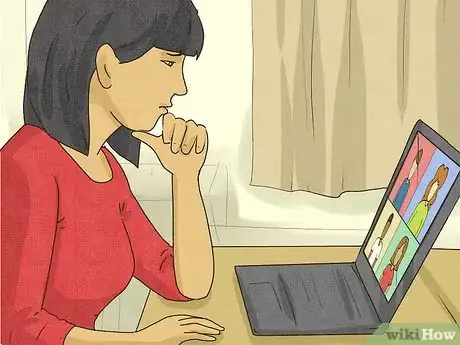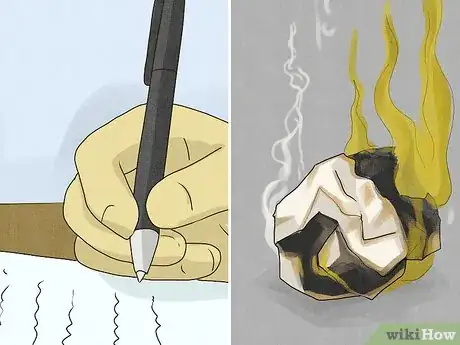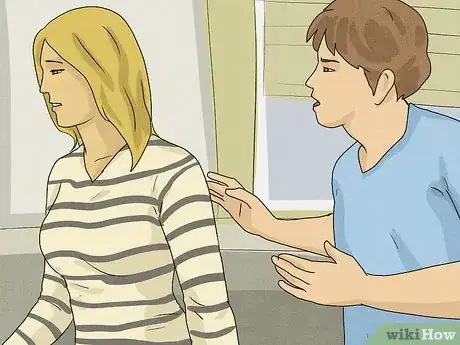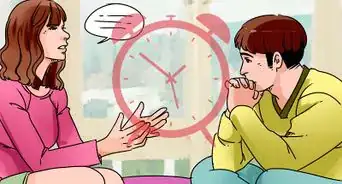This article was co-authored by Lauren Urban, LCSW. Lauren Urban is a licensed psychotherapist in Brooklyn, New York, with over 13 years of therapy experience working with children, families, couples, and individuals. She received her Masters in Social Work from Hunter College in 2006, and specializes in working with the LGBTQIA community and with clients in recovery or considering recovery for drug and alcohol use.
There are 10 references cited in this article, which can be found at the bottom of the page.
This article has been viewed 197,500 times.
Feeling guilty after cheating is a totally normal response. However, beating yourself up constantly to the point that it’s affecting your mental well-being isn’t healthy, and you don’t deserve to feel that way. Instead of feeling guilty, you can learn from your mistakes, forgive yourself, and move on. We know that’s easier said than done, and that’s why we’re here to help. We’ve put together a list of helpful, practical steps you can take to start overcoming your guilt and make amends with your partner.
Steps
Seeking Support
-
1Get the advice of someone you trust. Reach out to a third party to get their take about how you should move forward. Explain exactly what happened to the person and ask for their feedback.[1]
- Choose someone who you can trust to keep your secret. Someone who is older and/or wiser often makes a great advisor. For example, if you have a coworker or friend who healed their relationship after cheating, they might be a good choice to confide in. Avoid confiding in someone who might feel guilty about keeping your secret or who might be overly judgmental about you hurting your partner.
- Go to the person and say, "I made a huge mistake and cheated. I know it was wrong, but I don't want it to ruin my relationship." Then, go on to explain the events leading up to the cheating and ask for specific advice, like whether you should break the news to your partner and how to do that.
-
2Participate in an online or local support group. Look for support groups in your city or online that cater to people who have cheated. Here, you can talk to others who have dealt with guilt and find out how they overcame it.[2]
- Guilt often intensifies when you put up walls and isolate from others. By opening up to people who can relate to your situation, you can work to overcome guilt.[3]
Advertisement -
3See a therapist for serial cheating. If you have cheated numerous times, you may need to work with a professional to address the underlying cause of your cheating. Find a therapist in your area who specializes in relationship issues.[4]
- In therapy, you can identify the root need that is not being met, so you no longer feel the urge to cheat.
- When you stop the chronic cheating, you will ultimately experience less guilt.
-
4Seek spiritual advice. If you have spiritual or religious beliefs, try consulting with an advisor you respect. A spiritual leader will be able to listen to you without casting judgment and offer you practical solutions for overcoming the guilt you feel.[5]
- Ask your spiritual advisor for an in-person meeting in which you can seek support and guidance about the dilemma.
- This person may be able to offer you valuable counseling on your own and with your partner, if it comes to that.
Forgiving Yourself
-
1Accept that you are only human. Convert guilt into something empowering by being compassionate towards yourself. You are not the first to cheat—lots of others have stood in your shoes. Recognize that common thread of humanity and you won't feel so guilty for making a mistake.[6]
- You might softly caress your shoulders and back while saying “I am only human. I am not perfect. I will make mistakes.”
- This affirmation doesn't excuse your wrongdoing—it simply helps alleviate your suffering. You may add an addendum to the statement with something like "I did wrong, but I can try to make amends and do better in the future."
-
2Write about the situation. Unload the painful feelings you are experiencing through a journaling activity. Doing so can help ease guilt and give you some objectivity about the situation. You may even uncover a solution while writing.[7]
- Write out in vivid detail exactly what happened. Express your thoughts and feelings about the situation. You might say, "I slept with my ex. I regret it, but I feel so guilty. I don't want my partner to find out, but I don't know how to move forward."
- If you are worried about someone else reading what you wrote, you might put the paper into a shredder or set it on fire. This act of destruction can also help symbolize that the cheating (and guilt) doesn't have to continue to affect you.
-
3Perform rituals if you are a spiritual person. Use your belief in a higher power to overcome guilt. You might do this by reading scripture, praying, meditating, fasting, or confiding in a spiritual advisor.[8]
- Your faith may offer guidance as to how you can move forward after cheating. Following spiritual practices may give you peace and acceptance that ultimately minimize guilt.
-
4Focus on the future, not the past. It's easy to get down on yourself about cheating, but dwelling on the past will only keep you hostage. Practice thought-stopping when guilty feelings emerge. Rather than entertaining them, ask yourself “What now?” and try to continuously take positive action that moves you forward.[9]
- For example, if negative thoughts arise about what you've done in the past, you might ask "What now?" and identify one small positive action you can take. Actions might include taking your partner out for a romantic date or committing to spending more quality time with them.
-
5Give it time. Guilt, like all emotions, changes shape with passing time. Rather than thinking you must do something to relieve yourself of it, have patience that it will eventually fade.[10]
- Be on the lookout for negative coping that can lead to depression, addiction, or other emotional problems. Avoid getting through the tough time by withdrawing from others, throwing yourself into work, or using alcohol or drugs.
Making Amends
-
1End the love triangle to overcome your guilt. The only way to move forward without guilt is to stop cheating. Being in two relationships is unfair to both the person you are cheating on and the person you are cheating with. Decide who you want to be with and walk away from the secondary relationship.[11]
- For example, if you have fallen in love with someone else and no longer like your boyfriend, end that relationship and commit to the new person. If you regret cheating on your spouse and want to strengthen your marriage, stop seeing the new person altogether.
-
2Decide if you should confess. If your partner doesn't already know about the cheating, don't assume telling will make you (or them) feel better. Confessions of infidelity introduce immense pain, distrust, and insecurity into the relationship. Weigh the pros and cons before telling your partner about the cheating.[12]
- You should definitely confess if your cheating involved unprotected sex that compromises your original partner’s health. You should also tell if there is a likelihood of your partner finding out from another source.
- Ultimately, telling the truth is the best choice if you want to save the relationship. Keep in mind that not confessing further undermines your partner's ability to trust you.
-
3Commit to fidelity and honesty from now on. Regardless of whom you decide to be with, make an oath to be faithful and straightforward with your partner(s) in the future. If you prefer not to be in a monogamous relationship, everyone involved should be on board.[13]
- If your partner knows about the cheating and chooses to give you another chance, you might perform a symbolic "recommitment" ritual to demonstrate that you plan to be faithful from now on.
- Don't expect automatic forgiveness—put in extra effort to show that you can be trusted in the future. This might involve being straightforward about your movements when you're away from your partner or even granting them access to your phone or email.
- Even though you did your partner wrong, you should not accept abuse or mistreatment simply to gain their forgiveness.
-
4Identify the lesson from the situation. How can you use this experience as a growth opportunity? Reflect on how the cheating happened and try to learn from the mistake. This can help you break behavioral and thought patterns that led you to cheat in the first place.[14]
- For example, maybe you weren't open with your partner about what you wanted in the bedroom. You simply decided to find that elsewhere. In the future, it can help to be more forthcoming about your sexual needs.
- Maybe you shared your relationship problems with your coworker rather than your spouse. In the future, you might discuss such matters only with someone—particularly your spouse—who won't use your vulnerability as an opening for an affair.
-
5Attend counseling together. If you are hoping to repair the relationship with your original partner, couples counseling can help you identify problem areas and work to resolve them. Your therapist can help you revive your relationship by facilitating better communication, suggesting ways to add more spontaneity to your life, and even enhancing sexual intimacy.[15]
- Look for couples counselors in your area who have experience helping people through infidelity.
Expert Q&A
Did you know you can get expert answers for this article?
Unlock expert answers by supporting wikiHow
-
QuestionWhy do people have emotional affairs?
 Lauren Urban, LCSWLauren Urban is a licensed psychotherapist in Brooklyn, New York, with over 13 years of therapy experience working with children, families, couples, and individuals. She received her Masters in Social Work from Hunter College in 2006, and specializes in working with the LGBTQIA community and with clients in recovery or considering recovery for drug and alcohol use.
Lauren Urban, LCSWLauren Urban is a licensed psychotherapist in Brooklyn, New York, with over 13 years of therapy experience working with children, families, couples, and individuals. She received her Masters in Social Work from Hunter College in 2006, and specializes in working with the LGBTQIA community and with clients in recovery or considering recovery for drug and alcohol use.
Licensed Psychotherapist
References
- ↑ https://www.psychologytoday.com/blog/the-squeaky-wheel/201409/5-ways-know-youre-confiding-in-the-right-person
- ↑ https://www.psychologytoday.com/blog/the-squeaky-wheel/201409/5-ways-know-youre-confiding-in-the-right-person
- ↑ https://www.psychologytoday.com/blog/anger-in-the-age-entitlement/201308/guilt-after-betrayal
- ↑ https://www.psychologytoday.com/blog/resolution-not-conflict/201111/recovery-affair
- ↑ https://www.psychologytoday.com/blog/suffer-the-children/201309/after-the-infidelity-can-counseling-help
- ↑ https://www.psychologytoday.com/blog/anger-in-the-age-entitlement/201308/guilt-after-betrayal
- ↑ https://tinybuddha.com/blog/let-go-guilt-keeps-chained-past/
- ↑ https://www.huffingtonpost.com/2013/02/06/after-an-affair-are-you-w_n_2568503.html
- ↑ https://tinybuddha.com/blog/let-go-guilt-keeps-chained-past/
- ↑ https://www.mentalhelp.net/articles/emotional-coping-and-divorce/
- ↑ https://www.psychologytoday.com/blog/resolution-not-conflict/201111/recovery-affair
- ↑ https://www.psychologytoday.com/blog/love-and-sex-in-the-digital-age/201706/should-you-tell-your-partner-you-cheated
- ↑ http://content.time.com/time/arts/article/0,8599,1820942,00.html
- ↑ https://www.huffingtonpost.com/2013/02/06/after-an-affair-are-you-w_n_2568503.html
- ↑ https://www.goodtherapy.org/learn-about-therapy/issues/infidelity
About This Article
Overcoming your guilt after cheating can be a difficult process, but start by breaking things off with the other person and stopping all contact with them. You should also commit to never cheating again so you can move forward with your life. In addition to drawing a line under your infidelity, decide whether it’s right to confess to your partner, since continuing to lie can make things worse. However, don’t tell them just to get get rid of your guilt, since this won’t necessarily work. If you’re feeling depressed or overwhelmed, try writing your feelings down in a journal, which will help you to make sense of your emotions. You can also talk to a therapist or join a support group to help you work through your emotions. For more tips, including how to learn from your mistake and understand where you went wrong, read on!










































































